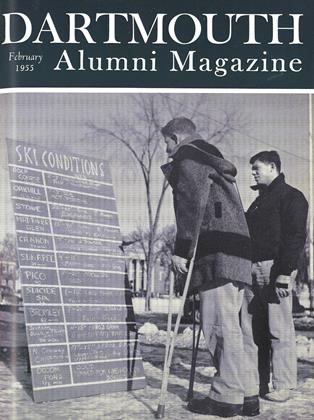DARTMOUTH fraternity men who have for some time been aroused over the discriminatory clauses imposed by some national fraternities, and who have been among those leading the battle against such clauses, were once more in the news last month on this same general issue.
Thirteen undergraduate members of Sigma Phi Epsilon signified their intention to withdraw from membership as the result of a chapter decision to remain affiliated with the national organization, after two Jewish pledges had been declared ineligible by the national group. It was the contention of the thirteen who withdrew that the local fraternity had a moral duty to initiate the two students after having pledged them, whatever the national fraternity ruled. The thirteen who resigned represent one-third of the chapter members at Dartmouth.
The editorial page of The Dartmouth reflected the nature of the struggle in editorials and letters to the editor. In a state- ment by the president of Sigma Phi Epsilon, the college chapter's need for financial aid from the national office was cited, as well as the support of the alumni body. The campus president maintained that the house has no intention of giving up the long-range fight against discriminatory clauses and that it can best carry it forward by remaining a chapter within the national organization. A Dartmouth editorial read: "Organized discrimination has won." However, the editorial writer added, there is a solution - financial assistance from the College, which would help the local chapter in its problem of maintaining its old house, still unsold on School Street, and repairing the new one on Webster Avenue.
Ten of the resigning brothers signed two letters to The Dartmouth, steadfastly holding to their original stand, that they considered it a moral obligation of the local fraternity to initiate the pledges after having accepted them.
 View Full Issue
View Full Issue
More From This Issue
-
 Feature
FeaturePublic Interest an The Technological Revolution
February 1955 By LLOYD V. BERKNER -
 Feature
FeatureMan's Aggressive Nature
February 1955 By GEORGE E. GARDNER '25 -
 Class Notes
Class Notes1918
February 1955 By ERNEST H. EARLEY, W. CURTIS GLOVER, RICHARD P. WHITE -
 Class Notes
Class Notes1923
February 1955 By CHESLEY T. BIXBY, CHARLES H. JONES JR., TRUMAN T. METZEL -
 Class Notes
Class Notes1926
February 1955 By HERBERT H. HARWOOD, H. DONALD NORSTRAND, RICHARD M. NICHOLS -
 Article
ArticleThe Underĝraduate Chair
February 1955 By G. H. CASSELS-SMITH '55







